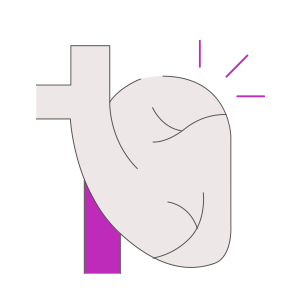How is HCM diagnosed?
HCM is usually diagnosed through a combination of your medical history, a physical examination, and specific tests.Cardiomyopathy UK. Hypertrophic Cardiomyopathy - How is HCM diagnosed. Available at https://www.cardiomyopathy.org/about-cardiomyopathy/types-cardiomyopathy/hypertrophic-cardiomyopathy . Last accessed October 2025.
Your doctor may ask you to describe the symptoms you are experiencing and ask about your family history. It’s important to mention any family members with heart issues or who have experienced similar symptoms.NHS, (2023). Cardiomyopathy. Available at: https://www.nhs.uk/conditions/cardiomyopathy/... . Last accessed October 2025.
If your doctor suspects an underlying health condition, they may refer you to a specialist healthcare team. The team might perform these tests:NHS, (2023). Cardiomyopathy. Available at: https://www.nhs.uk/conditions/cardiomyopathy/... . Last accessed October 2025.
- Electrocardiogram (ECG): This records the electrical activity of your heart, helping doctors see if there are any abnormalities in the heart’s rate or rhythm.
- Echocardiogram (echo): This heart ultrasound is the primary test for diagnosing HCM. It uses sound waves to take pictures of your heart, helping doctors to check if it is working properly.
- Magnetic resonance imaging (MRI): If an echo doesn’t provide enough information, an MRI can offer a detailed image of the inside of your body. An MRI scan produces a detailed picture of the inside of your body using strong magnets and radio waves, helping doctors see things like muscles and organs.
- Genetic testing: When imaging tests show less thickening of the heart muscle walls, genetic testing may be done to check if HCM has been passed down to you by a family member.
- Exercise test: In this test, the heart activity and symptoms are monitored while undergoing a controlled exercise regimen.







